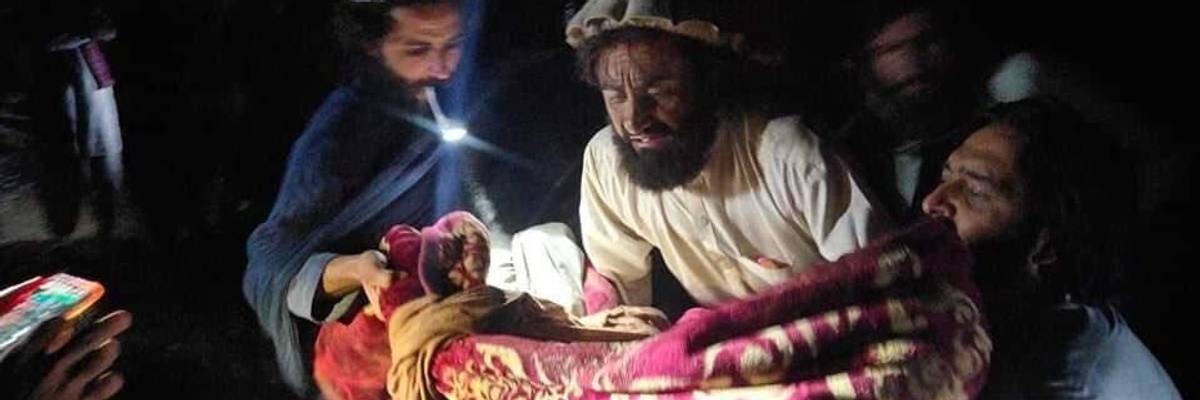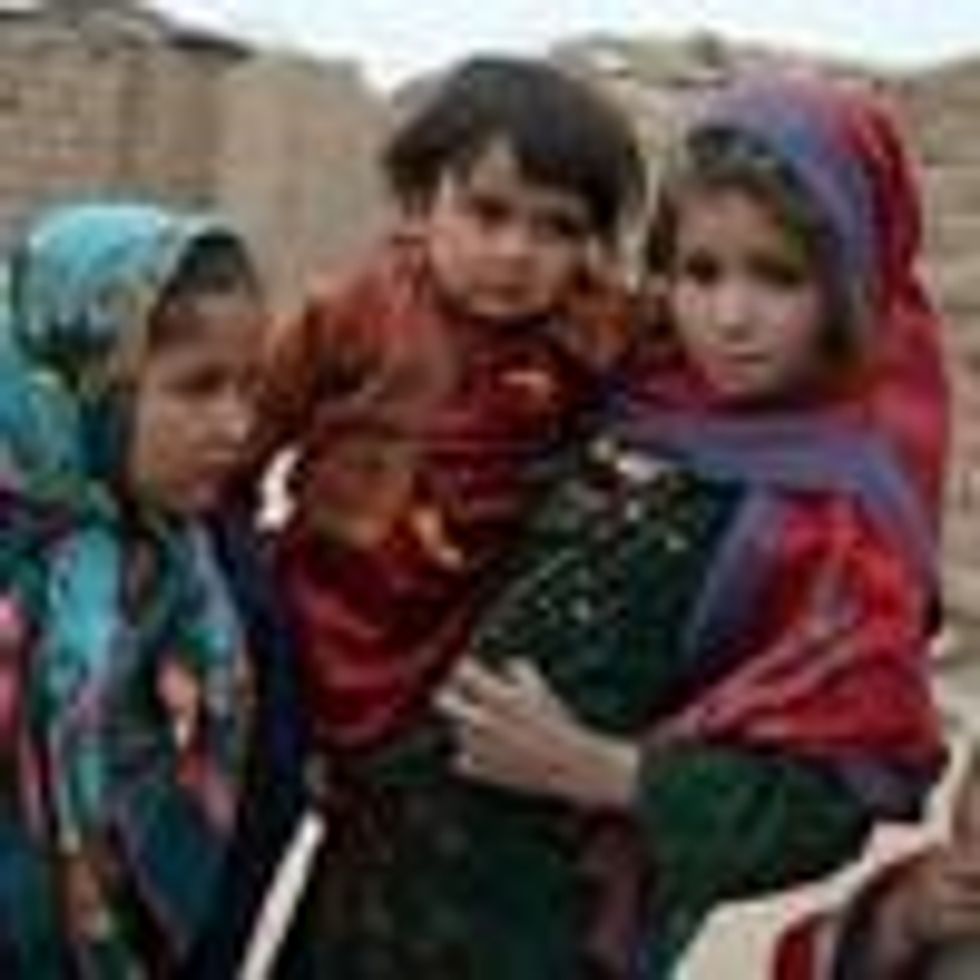

SUBSCRIBE TO OUR FREE NEWSLETTER
Daily news & progressive opinion—funded by the people, not the corporations—delivered straight to your inbox.
5
#000000
#FFFFFF
To donate by check, phone, or other method, see our More Ways to Give page.


Daily news & progressive opinion—funded by the people, not the corporations—delivered straight to your inbox.

Afghans evacuate the wounded following an earthquake in the province of Paktika in eastern Afghanistan on June 22, 2022. (Photo: Bakhtar News Agency via AP)
A powerful earthquake in Afghanistan killed more than 900 people and injured hundreds more on Wednesday, flattening homes and devastating entire villages in a nation already ravaged by decades of U.S.-led war and an ongoing economic collapse.
The earthquake, which hit overnight, had an estimated magnitude of 6.1 with an epicenter near the nation's border with Pakistan.
"The death toll is likely to rise as some of the villages are in remote areas in the mountains and it will take some time to collect details," said Salahuddin Ayubi, an official with the country's interior ministry, as disaster relief efforts continued.
Maulawi Sharafuddin Muslim, acting deputy minister of Afghanistan's national disaster authority, said during a news conference Wednesday that "some villages have been completely destroyed" and that he's awaiting additional "details about the damages to houses."
One resident of the Paktika province, which was hit particularly hard by the earthquake, told reporters that "most of the victims are women and children because they were caught asleep by the calamity."
"There is absolute shortage of resources, doctors, and all other things needed," he said. "People don't know what to do."
The massive earthquake struck in the midst of an economic nightmare in Afghanistan, where tens of millions of people--including many children--are facing acute hunger as the U.S. and European nations strangle the country's economy with sanctions and other punitive measures.
Last August, following the Taliban's return to power after two decades of U.S. occupation, the Treasury Department froze billion of dollars in Afghan central bank assets despite warnings that the move would worsen the country's humanitarian crisis. Months later, the Biden administration went a step further by announcing the permanent seizure of the funds.
Related Content

The crippling sanctions, which the U.S. and Europe have presented as an effort to keep money out of the hands of the Taliban, have further strained the budgets of aid agencies and humanitarian groups operating inside the country, undermining emergency relief efforts.
"The aid economy here has been devastated," Kabul-based Al Jazeera journalist Ali Latifi said Wednesday. "They will really struggle to deal with this issue until international aid agencies can pump in money, can pump in more support. Because at the moment, they're really undersourced and underfunded."
Dear Common Dreams reader, The U.S. is on a fast track to authoritarianism like nothing I've ever seen. Meanwhile, corporate news outlets are utterly capitulating to Trump, twisting their coverage to avoid drawing his ire while lining up to stuff cash in his pockets. That's why I believe that Common Dreams is doing the best and most consequential reporting that we've ever done. Our small but mighty team is a progressive reporting powerhouse, covering the news every day that the corporate media never will. Our mission has always been simple: To inform. To inspire. And to ignite change for the common good. Now here's the key piece that I want all our readers to understand: None of this would be possible without your financial support. That's not just some fundraising cliche. It's the absolute and literal truth. We don't accept corporate advertising and never will. We don't have a paywall because we don't think people should be blocked from critical news based on their ability to pay. Everything we do is funded by the donations of readers like you. Will you donate now to help power the nonprofit, independent reporting of Common Dreams? Thank you for being a vital member of our community. Together, we can keep independent journalism alive when it’s needed most. - Craig Brown, Co-founder |
A powerful earthquake in Afghanistan killed more than 900 people and injured hundreds more on Wednesday, flattening homes and devastating entire villages in a nation already ravaged by decades of U.S.-led war and an ongoing economic collapse.
The earthquake, which hit overnight, had an estimated magnitude of 6.1 with an epicenter near the nation's border with Pakistan.
"The death toll is likely to rise as some of the villages are in remote areas in the mountains and it will take some time to collect details," said Salahuddin Ayubi, an official with the country's interior ministry, as disaster relief efforts continued.
Maulawi Sharafuddin Muslim, acting deputy minister of Afghanistan's national disaster authority, said during a news conference Wednesday that "some villages have been completely destroyed" and that he's awaiting additional "details about the damages to houses."
One resident of the Paktika province, which was hit particularly hard by the earthquake, told reporters that "most of the victims are women and children because they were caught asleep by the calamity."
"There is absolute shortage of resources, doctors, and all other things needed," he said. "People don't know what to do."
The massive earthquake struck in the midst of an economic nightmare in Afghanistan, where tens of millions of people--including many children--are facing acute hunger as the U.S. and European nations strangle the country's economy with sanctions and other punitive measures.
Last August, following the Taliban's return to power after two decades of U.S. occupation, the Treasury Department froze billion of dollars in Afghan central bank assets despite warnings that the move would worsen the country's humanitarian crisis. Months later, the Biden administration went a step further by announcing the permanent seizure of the funds.
Related Content

The crippling sanctions, which the U.S. and Europe have presented as an effort to keep money out of the hands of the Taliban, have further strained the budgets of aid agencies and humanitarian groups operating inside the country, undermining emergency relief efforts.
"The aid economy here has been devastated," Kabul-based Al Jazeera journalist Ali Latifi said Wednesday. "They will really struggle to deal with this issue until international aid agencies can pump in money, can pump in more support. Because at the moment, they're really undersourced and underfunded."
A powerful earthquake in Afghanistan killed more than 900 people and injured hundreds more on Wednesday, flattening homes and devastating entire villages in a nation already ravaged by decades of U.S.-led war and an ongoing economic collapse.
The earthquake, which hit overnight, had an estimated magnitude of 6.1 with an epicenter near the nation's border with Pakistan.
"The death toll is likely to rise as some of the villages are in remote areas in the mountains and it will take some time to collect details," said Salahuddin Ayubi, an official with the country's interior ministry, as disaster relief efforts continued.
Maulawi Sharafuddin Muslim, acting deputy minister of Afghanistan's national disaster authority, said during a news conference Wednesday that "some villages have been completely destroyed" and that he's awaiting additional "details about the damages to houses."
One resident of the Paktika province, which was hit particularly hard by the earthquake, told reporters that "most of the victims are women and children because they were caught asleep by the calamity."
"There is absolute shortage of resources, doctors, and all other things needed," he said. "People don't know what to do."
The massive earthquake struck in the midst of an economic nightmare in Afghanistan, where tens of millions of people--including many children--are facing acute hunger as the U.S. and European nations strangle the country's economy with sanctions and other punitive measures.
Last August, following the Taliban's return to power after two decades of U.S. occupation, the Treasury Department froze billion of dollars in Afghan central bank assets despite warnings that the move would worsen the country's humanitarian crisis. Months later, the Biden administration went a step further by announcing the permanent seizure of the funds.
Related Content

The crippling sanctions, which the U.S. and Europe have presented as an effort to keep money out of the hands of the Taliban, have further strained the budgets of aid agencies and humanitarian groups operating inside the country, undermining emergency relief efforts.
"The aid economy here has been devastated," Kabul-based Al Jazeera journalist Ali Latifi said Wednesday. "They will really struggle to deal with this issue until international aid agencies can pump in money, can pump in more support. Because at the moment, they're really undersourced and underfunded."